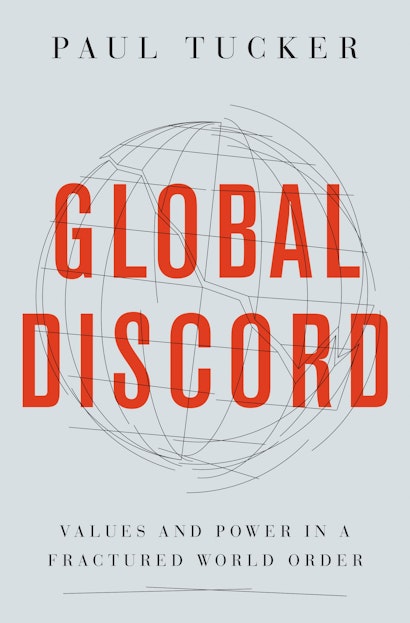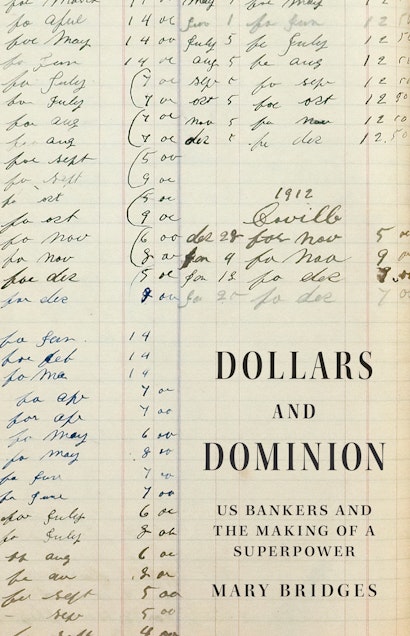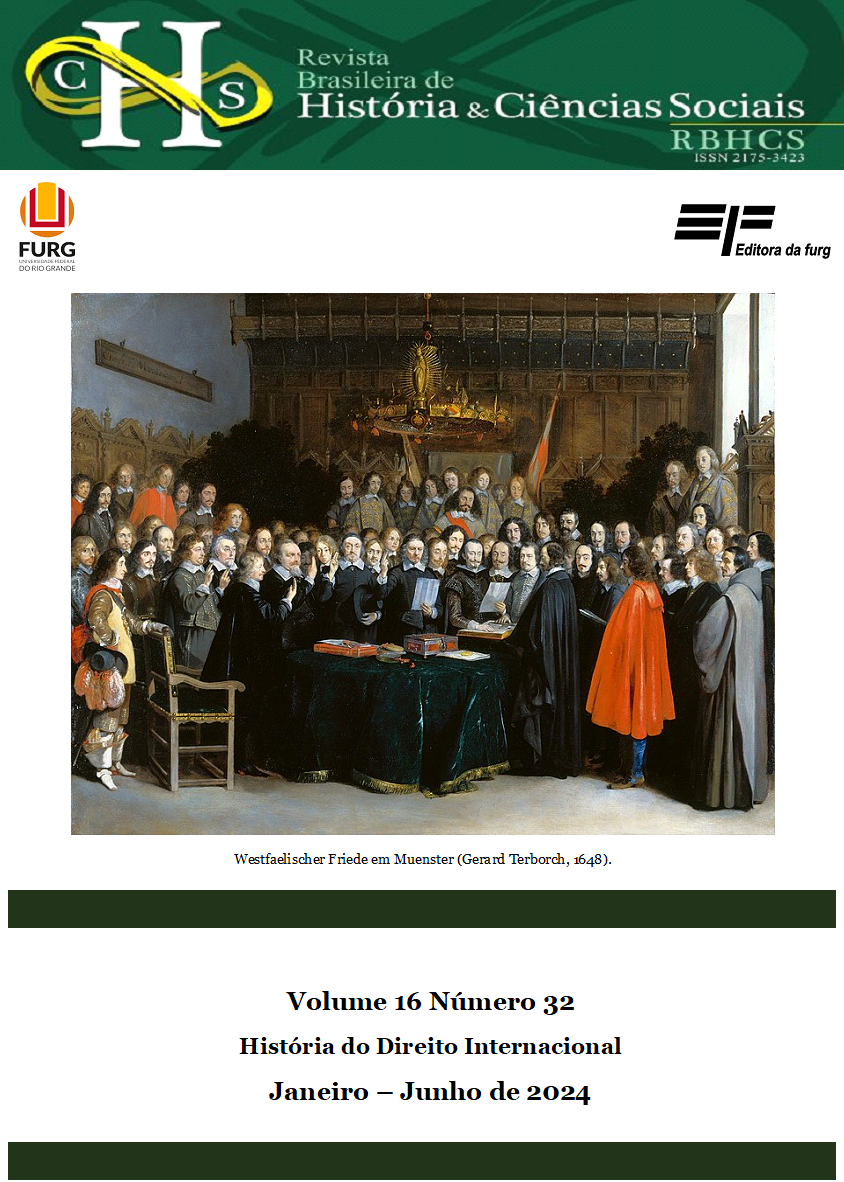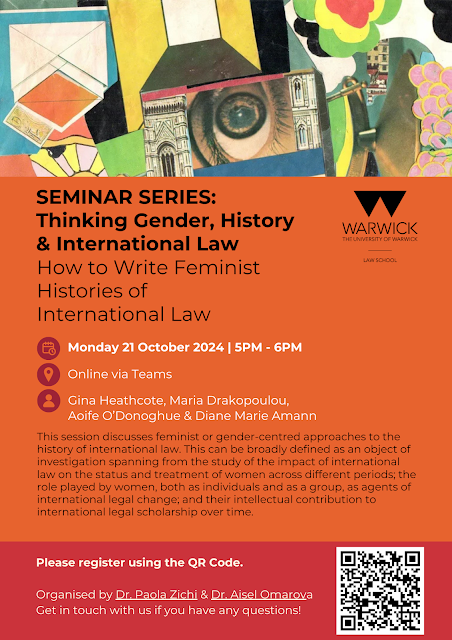 |
| Source: PUP |
Website of the European Society of International Law's Interest Group on the History of International Law.
ESIL Interest Group History of International Law

Thursday, 31 October 2024
BOOK: Isaac NAKHIMOVSKY, "The Holy Alliance: Liberalism and the Politics of Federation" (Princeton University Press, 2024)
BOOK: Kenneth MACK & Jacob KATZ COGAN & (eds.), "In Between and Across: Legal History Without Boundaries" (OUP, 2024)
| Source: OUP |
BOOK: Paul TUCKER, "Global Discord: Values and Power in a Fractured World Order" (Princeton University Press, 2024)
 |
| Source: PUP |
Description:
Thursday, 24 October 2024
BOOK: Mary BRIDGES, "Dollars and Dominion: US Bankers and the Making of a Superpower" (Princeton University Press, 2024)
 |
| Source: PUP |
Description:
Wednesday, 23 October 2024
CALL FOR EXPRESSION OF INTEREST: (De-/re-)constructions of International Law over Time and Space, ESIL Interest Group for the History of International Law (2025 ESIL Annual Conference on “Reconstructing International Law”, Freie Universität Berlin, 10-13 September 2025, DEADLINE: 15 January 2025)
Call
for Expression of Interest
ESIL
Interest Group on the History of International Law
Agora
Panel Proposal for the ESIL Annual Conference 2025
(De-/re-)constructions of International Law over
Time and Space
Berlin,
10 to 13 September 2025
Submission
deadline: 15 January 2025
The ESIL Interest Group on the History of International Law is
preparing an Agora panel proposal on ‘(De-/re-)constructions of
International Law over Time and Space’ for the 2025 ESIL Annual Conference
“Reconstructing International Law” in Berlin, Germany. The outcome of the Agora
proposal is uncertain, but the panel speakers will be invited to present at the
interest group pre-conference workshop, if the Agora proposal is not selected
by the conference organizers.
Themes
This Agora aims to better understand the theme of ‘reconstructing
international law’ from a historical perspective: (1) What have been the causes
and reasons for (re-)constructions of international law in its history? (2) How
has international law fared after past major systemic crises? (3) What can we
learn from institutional and normative projects of (re-)constructing ‘new’
international law in the past?
Until modern times, international relations were determined by the
good will of the sovereign and force played the dominant role in these
relations. There has been no agreed definition as to when ‘international law’
exactly began, but it is generally agreed that (de-/re-)construction has been a
common theme in the history of international law at various moments in time, with
the Westphalian Peace of 1648 being marked as one of the most famous watershed
moments. The subsequent transition from European public law to international
law through colonial expansion was another important moment of territorial
‘reconstruction.’ Conversely, one might inquire about the extent to which
decolonization and the admission of newly independent states has led to the
‘reconstruction’ of Eurocentric international law in the 20th
century.
At the same time, reconstruction can be approached from an
institutional perspective or through the historical expansion of the actors or
sources of international law. One could also explore the (de-/re-) construction
of international law through the rise and fall of its individual sub-disciplines
or by looking at reconstruction within and across sub-disciplines. Apart from successful
(de-/re-) construction, the failed attempts of various actors to (de-/re-)construct
international law could provide important lessons about reform. In addition to
the restructuring of international law in the history, we are also interested
in papers discussing the restructuring of ‘the history of international law’ as
a discipline, its theories, and methodologies.
The IG particularly encourages interdisciplinary research engaging
with historical methods, such as the use of archives and other historical
sources. Perspectives from underrepresented regions and critical scholars are
particularly welcomed.
Submission procedure
Members of the HIL IG and other ESIL Members working on related
topics are invited to express their interest in participating by sending to lamsh@vuw.leidenuniv.nl
prior to the deadline the following documents:
-
An Abstract of no more than 400
words
-
Your curriculum vitae
-
Your short biography,
indicating whether you are an ESIL member and whether you are applying for the
ESIL Early-Career Scholar Prize
Timeline
The deadline for expressing interest in the Agora panel proposal is 15
January 2025. We expect to inform successful applicants before 31
January 2025 if they will be part of the Proposal.
If you have any questions, feel free to contact Ocean: lamsh@vuw.leidenuniv.nl.
Please note that the Interest Group is prioritizing those who could
present their papers in person. However, the Interest Group is
unable to provide funding for travel and accommodation. Selected speakers will
be expected to bear the costs of their own travel and accommodation. Some ESIL
travel grants and ESIL carers’ grants will be available to offer partial financial
support to speakers who have exhausted other potential funding sources.
Please see the ESIL website
for all relevant information about the conference.
Conveners
Anastasia
Hammerschmied – Florenz Volkaert - Jaanika Erne – Sze Hong Lam (Ocean)
Tuesday, 15 October 2024
SEMINAR SERIES: "Thinking Gender, History, & International Law" (University of Warwick/Teams, October 2024 - March 2025)
Description:
Monday, 14 October 2024
SPECIAL ISSUE: Revista Brasileira de História & Ciências Sociais, "História do Direito Internacional" (Volume 16, Issue 32, 2024)
 |
| Source: Revista Brasileira de Historia & Ciencias Sociais |
Description:
Apresentação do Volume 16 Número 32 da Revista Brasileira de História & Ciências Sociais
Denize Terezinha Leal Freitas, Fabiano Quadros Rückert, José Carlos da Silva Cardozo, Jonathan Fachini da Silva, Tiago da Silva Cesar, Wagner Silveira Feloniuk
4-5
História do Direito Internacional
Augusto Jaeger Junior, Arno Dal Ri Jr., Lucas Carlos Lima
6-10
Dossiê
Percursos do Princípio das Nacionalidades nas doutrinas belgas de Direito Internacional: do Círculo de Gante à Escola de Lovânia (1863-1953)
DOI: https://doi.org/10.14295/rbhcs.v16i32.16513
Arno Dal Ri Jr
11-53
A cláusula da nação mais favorecida em tratados comerciais: percepções ocidentais sobre a prática latino-americana de tratados comerciais no final do século XIX e início do século XX
DOI: https://doi.org/10.14295/rbhcs.v16i32.16576
Florenz Volkaert, Fernando Muniz Shecaira
54-87
A participação brasileira na elaboração do Estatuto da CPJI: o papel de Clovis Bevilaqua a Raul Fernandes
DOI: https://doi.org/10.14295/rbhcs.v16i32.16509
Lucas Carlos Lima
88-107
A história da construção do modelo de produção tradicional do direito internacional
DOI: https://doi.org/10.14295/rbhcs.v16i32.16665
Amina Welten Guerra
108-138
A prática dos estados asiáticos na implementação do princípio de proteção de monumentos e obras de arte antes da Primeira Guerra Mundial
DOI: https://doi.org/10.14295/rbhcs.v16i32.16429
Alice Lopes Fabris
139-158
A obra literária de Carl Schmitt durante seus anos como protagonista jurídico do nacional-socialismo (1933-1936): uma sobreposição entre os escritos e os fatos
DOI: https://doi.org/10.14295/rbhcs.v16i32.16602
Marcelo Markus Teixeira
159-181
Decolonizing International Law: between demystifications and resignifications
DOI: https://doi.org/10.14295/rbhcs.v16i32.16555
Tatiana de A. F. R. Cardoso Squeff, Gabriel Pedro Dassoler Damasceno
182-205
O peticionamento das vítimas de violações de direitos humanos no sistema convencional das nações unida
DOI: https://doi.org/10.14295/rbhcs.v16i32.16529
Cristina Figueiredo Terezo Ribeiro, Thaís Magno
206-245
De objetivos universais a resultados locais: apontamentos para uma história da proteção regional aos direitos humanos
DOI: https://doi.org/10.14295/rbhcs.v16i32.16586
Alexander de Castro
246-269
Direitos africanos dos Direitos Humanos – análise desde a perspectiva jurídico-histórica
DOI: https://doi.org/10.14295/rbhcs.v16i32.16565
João Francisco
270-298
A talidomida no banco dos réus: o julgamento de Alsdorf (Alemanha, 1968) a partir da imprensa brasileira
DOI: https://doi.org/10.14295/rbhcs.v16i32.16582
Francieli Lunelli Santos
299-323
A Resiliência da Identidade: Indigenato e a Virada Histórica no Direito Internacional
DOI: https://doi.org/10.14295/rbhcs.v16i32.16369
Lucas Lixinski
324-354
O Supremo Acordo: usos jurídicos do passado da Anistia no julgamento da Arguição de Descumprimento de Preceito Fundamental n. 153
DOI: https://doi.org/10.14295/rbhcs.v16i32.16715
Ilanil Coelho, Pedro Odainai
355-390
Interesses políticos na evolução histórica do Direito Internacional dos Refugiados e no caso ucraniano: entre humanitarismo e seletividade na prática europeia
DOI: https://doi.org/10.14295/rbhcs.v16i32.16537
Augusto Jaeger Junior, Ricardo Strauch Aveline
391-420
Das contribuições de Francisco de Vitória ao necessário giro epistemológico para as Américas: o Direito Internacional redimensionado a partir do Sul Global
DOI: https://doi.org/10.14295/rbhcs.v16i32.16568
Thiago Giovani Romero, Wanda Helena Mendes Muniz Falcão, Vinicius Villani Abrantes
421-438
O solidarismo de Hugo Grócio como princípio normativo de um constitucionalismo transnacional no século XXI
DOI: https://doi.org/10.14295/rbhcs.v16i32.16724
Anderson Vichinkeski Teixeira
More info with the publisher.
Thursday, 10 October 2024
SEMINAR: "France, Europe, empires, XVIe – début XIXe siècle" (École Normale Supérieure de Paris, October 2024 - May 2025)
 |
| Source: IDHES |
Wednesday, 9 October 2024
BOOK: Philip STERN, "Empire, Incorporated: The Corporations That Built British Colonialism" (Harvard University Press, 2023)
 |
| Source: HUP |
Breaking from traditional histories in which corporations take a supporting role by doing the dirty work of sovereign states in exchange for commercial monopolies, Philip Stern argues that corporations took the lead in global expansion and administration. Whether in sixteenth-century Ireland and North America or the Falklands in the early 1980s, corporations were key players. And, as Empire, Incorporated makes clear, venture colonialism did not cease with the end of empire. Its legacies continue to raise questions about corporate power that are just as relevant today as they were 400 years ago.
Challenging conventional wisdom about where power is held on a global scale, Stern complicates the supposedly firm distinction between private enterprise and the state, offering a new history of the British Empire, as well as a new history of the corporation.
More info with the publisher.
Tuesday, 8 October 2024
BOOK: Patrick QUINTON-BROWN, "Intervention before Interventionism: A Global Genealogy" (OUP, 2024)
 |
| Source: OUP |
Description:
Intervention before Interventionism is about the ways in which statespeople have reordered intervention and non-intervention since the middle of the twentieth century. It is concerned primarily with non-Western contestations of Western-dominated order; it illustrates institutional change in and through decolonization; and it provides a conceptual roadmap for understanding dilemmas of intervention and non-intervention today, particularly in relation to contestation as it has re-emerged in the twenty-first century. While building on and conversing with existing literature, the book stands out from previous approaches insofar as it is a mapping of international struggles for the reconstitution of intervention in the globalization of the society of states.
Table of Contents:
Introduction1 Reconstituting intervention: Contestation and the Princeton Conference
2 Dictatorial intervention and the UN Charter
3 Anti-colonial intervention and the Bandung Spirit
4 ‘Friendly’ intervention and the Special Committee
5 Emancipatory intervention and the New International Orders
6 Liberal intervention and the Responsibilities to Protect
Epilogue


